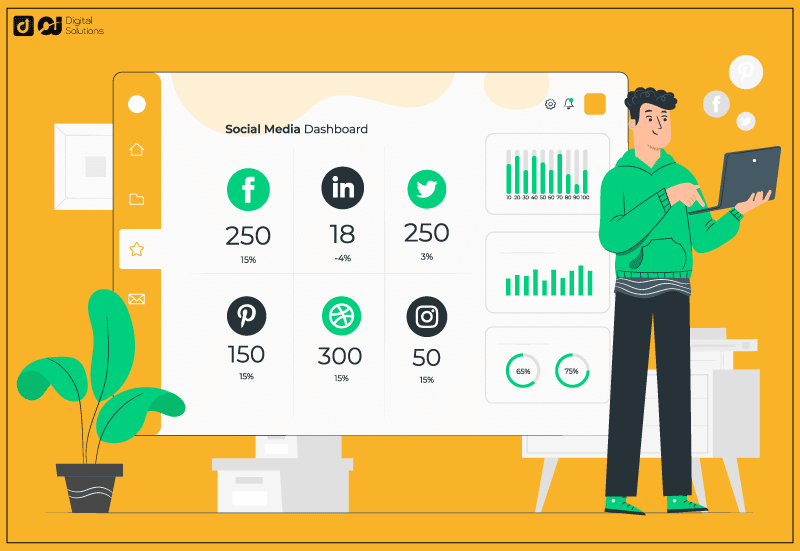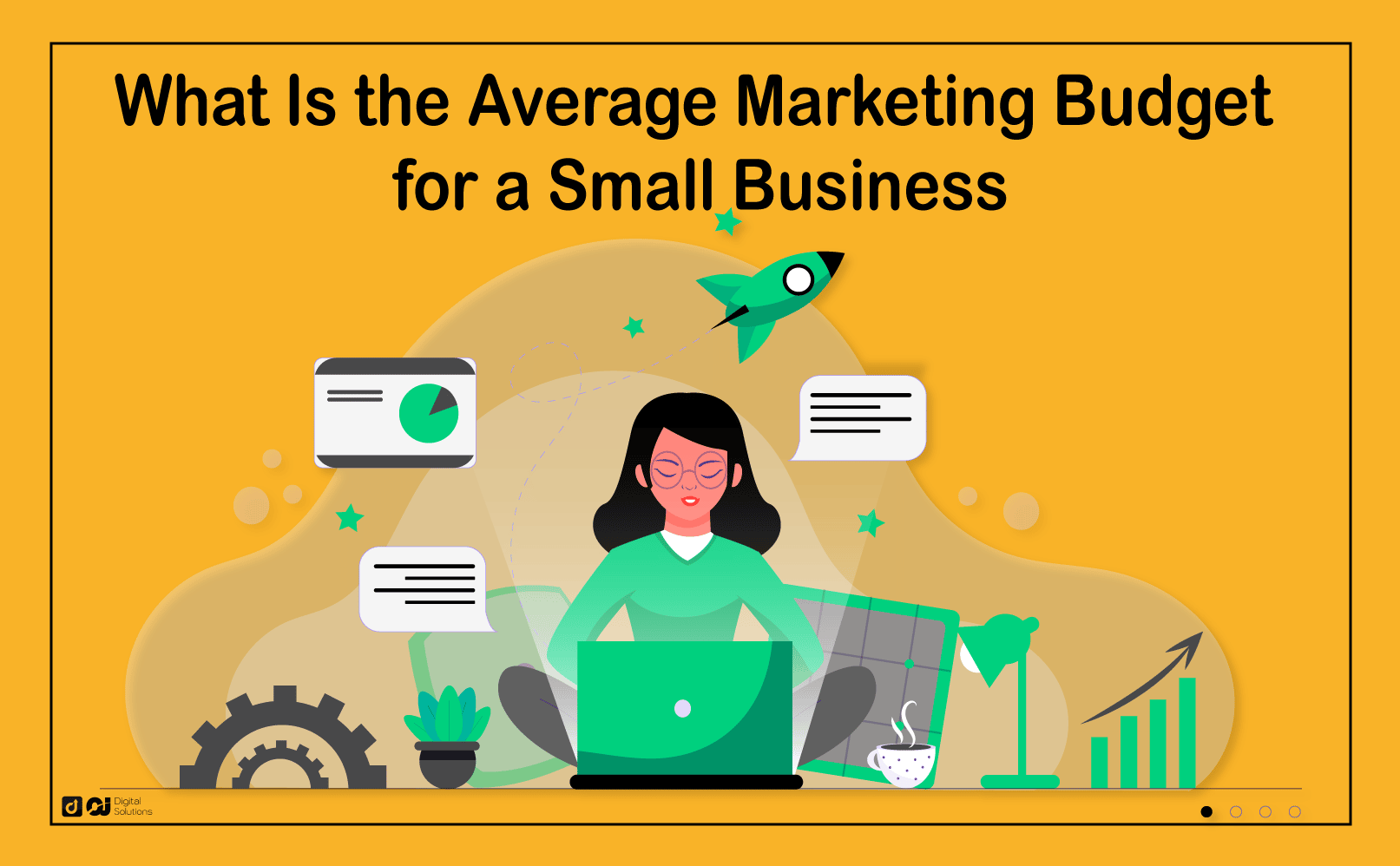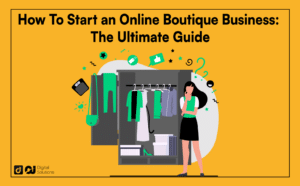Marketing is one of the most important aspects of a small business.
Without a solid marketing strategy, you can’t reach your target audience or promote your products.
The question is: What is a reasonable marketing budget for a small business?
I have the answer to this question.
I wrote this guide to discuss how much small business owners should spend on marketing costs.
Let’s begin.
What is Marketing?

Marketing is the process of creating value through the creation, promotion, and distribution of products or services. Marketing has four phases.
- Market research
- Product development
- Promotion
- Distribution
Market research involves gathering customer and competitor data.
Small businesses use this data to develop new products and determine how to promote and distribute them.
Product development is designing new products or modifying existing ones to meet consumer demands.
Meanwhile, promotion includes online and offline marketing campaigns, including social media marketing, email marketing, and paid ads.
Distribution means getting products to consumers through retailers, wholesalers, or direct sales.
Small business marketing is essential for entrepreneurs.
With a proper marketing plan, small businesses can create value for customers, reach a wider audience, and increase sales.
What Is the Average Marketing Budget for a Small Business?

There’s no easy answer to this question since all small businesses have different marketing budgets.
However, some general guidelines can help you determine how much you should allocate to your precious marketing budget.
According to the US Small Business Administration, the average marketing budget of most small businesses should be 7 to 8% of their revenue.
For example, if your small business makes $100,000 in annual sales, your average marketing budget should be around $7,000 to $8,000.
This general rule is a good starting point because it ensures small businesses aren’t spending too much or too little on their company’s advertising budget.
If you have a limited marketing team or digital marketing experience, you might get away with spending less than 7 to 8%.
However, a few factors can impact your average marketing budget.
If you’re in a competitive industry or launching a new product or service, you may need to increase your marketing expenditures to compete with more established companies.
There is no magic number when determining a good marketing budget for your small business because every business is unique.
Start with the 7 to 8% recommendation and adjust according to your specific business needs and based on the marketing metrics.
Factors That Will Affect Your Average Marketing Budget

Suppose you already have a killer product or service.
You’re ready to invest in various digital marketing campaigns to reach your marketing goals.
Before you start spending, sit down and consider the appropriate marketing budget for a small business.
How much can you realistically afford to spend on marketing monthly?
Here are five factors to consider when determining your average marketing budget.
Company Size
A small family operation will have a smaller marketing budget than a massive corporation.
Use a percentage of your monthly revenue as your marketing budget and stick to it.
If your monthly gross revenue is $10,000, your marketing budget could be $700 (7% of $10,000).
Industry and Competition
The second factor is industry and competition. If you’re in an industry with deep-pocketed competitors, your average marketing budget will be higher than a small business in a less competitive industry.
You’ll need to work harder and increase your marketing investments to reach your potential clients. Your goal is to put your product or service in front of the right people.
Geographic Location
Are you targeting local, national, or international markets?
The larger the geographical area you’re trying to reach, the higher the marketing budget you’ll need.
How much of your budget will you use to run your digital marketing campaigns within a specific location?
Sales Cycle Length
The sales cycle length is the time it takes someone to go from being aware of your product or service to purchasing it.
If your sales cycle is short, your marketing costs won’t be high because most people are ready to buy what you’re selling.
However, if your sales cycle is longer, engaging in more top-of-funnel sales activities is essential because people still need time to learn about your product or service.
Your Marketing Channels
The marketing channels you use to deliver your message will affect the marketing budget for a small business.
Various marketing methods require different levels of investment.
There are channels you can use even with a limited marketing budget, but some can be costly.
Knowing which channels will work best for your target market will help you better determine how much you should allocate to your marketing budget.
Why Is Marketing Important for Small Businesses?
Here are some reasons your small business needs a good marketing strategy.
It Helps You Stand Out.
Big or small, all companies have competition.
The first step to standing out is understanding what makes your business unique and maximizing it.
Whether it’s a unique selling proposition or a specific target market, figuring out what differentiates your business is essential to success.
It Helps Build an Engaged Community.
Social media is important for your business because it allows small businesses to build customer relationships and foster an engaged community.
Posting fresh and relevant content and interacting with your followers can help you build a community of loyal customers who will help promote your business through word-of-mouth and social sharing and drive sales.
It Helps Increase Revenue.
Most companies want to increase revenue.
Marketing can help you create awareness for your product or service, generate leads, and convert leads into paying customers.
It Boosts Brand Recognition.
Before customers buy from you, they must know who you are. Thus, brand recognition should be one of your main goals when crafting a marketing strategy.
Improve your brand recognition with an integrated marketing strategy that delivers the same message across all channels, including your website, social media platforms, and ecommerce store if you have one.

It Helps You Reach Your Target Audience.

All small business owners should prioritize marketing.
Marketing will bring customers through your door and keep them coming back.
Tailor your marketing strategy to reach your target audience.
You’ll need to use your marketing budget to understand your customers’ needs and preferences and the digital channels they use the most.
Nailing down these details means your marketing efforts are working.
It Builds Relationships.
For customers to buy from you, they need to trust you. For them to trust you, they need to have a positive relationship with your brand.
Regardless of your marketing budget size, your goal is to create a strong with your target customers in all marketing channels (social media, email, paid ads, etc.).
It’s an Investment.
Marketing budgets aren’t expenses—they’re investments.
While there are costs to launching a new marketing campaign or hiring a professional agency to help with branding, these marketing activities offer a return on investment.
The return on your investment could be more leads, more repeat customers, or more sales.
How To Promote Your Business on a Limited Marketing Budget

As a small business owner, you likely wear a lot of hats. You’re the CEO, accountant, customer service representative, and marketing specialist.
You may be great at doing all these things but feel unsuccessful because you have a tiny marketing budget.
You don’t have to spend millions on marketing.
Here are some ways to effectively promote your business on a shoestring budget.
Social Media Marketing

Social media is a powerful tool to reach a wider audience without breaking the bank.
Platforms like Facebook, Twitter, and Instagram are free and offer many targeting options to help you zero in on your ideal customer.
Paid social media ads are also an option, but they’re not necessary to see results. You only have to ensure you’re creating compelling content that resonates with your target audience.
The cost of social media ads depends on the size and budget of your small business. However, you can expect to spend a few thousand dollars per year on social media advertising.
Content Marketing

Running a blog page is a great way to show off your industry expertise, attract new leads, and drive organic traffic to your website or online store.
If you don’t have the time or resources to write original content, there’s no shame in curating relevant articles from other sources. Just ensure you credit your sources.
You can promote your blog posts on your social media channels or even submit them as guest posts on other websites in your niche. Either way, blogging is an excellent way to get more eyes on your business without spending too much on advertising expenses.
Small companies typically have a limited budget for content marketing. Most will spend between $0 and $1,000 monthly on content marketing, while some will spend more than $5,000 monthly.
Networking

You don’t need an enormous advertising budget to promote your business effectively—sometimes, it only takes a little elbow grease.
Get out there and start networking! Attend industry events, join relevant online forums, and connect with other businesses in your niche.
The more people you meet, the more likely you can find new customers. You might even make valuable connections that could lead to joint ventures.
Guerilla Marketing
Use of guerilla marketing techniques.
If you’ve seen those funny, creative, or wacky marketing stunts, you’ve witnessed guerilla marketing in action!
A great example of guerilla marketing is the billboard for the TV show “Dracula.”
Guerilla marketing involves thinking outside the box and finding innovative ways to get people talking about your business.
You could hand out free samples or dress up like a giant chicken in high-traffic areas.
Regardless of how much budget you allocate to guerilla marketing, the key is to be creative and memorable. If successful, your small business will stay top-of-mind with potential customers.
Community Investments

Involve your business in local events and activities. Doing so shows potential customers you care about your local community.
You could sponsor a little league team, participate in a charity fundraising event, or set up a stall at the local farmer’s market.
People will be more likely to support your business if they see you’re an active community member.
List your small business on online directories and review sites like Google My Business or Yelp, making it easier for people to find your business information when they search for it online.
It’s also helpful to encourage customers to leave reviews on these sites since positive thoughts can help attract new customers. Ensure you respond promptly to negative reviews and do your best to resolve issues to prevent potential customers from getting turned off.
The Bottom Line
I hope my article helped you determine the appropriate marketing budget for your business.
Remember, it’s not the size of your budget that counts. I’ve shown you how your marketing efforts can still work on a limited budget.
I’ve discussed the significance of marketing, but it isn’t the only essential aspect of your business. You should also learn why a website is important.






